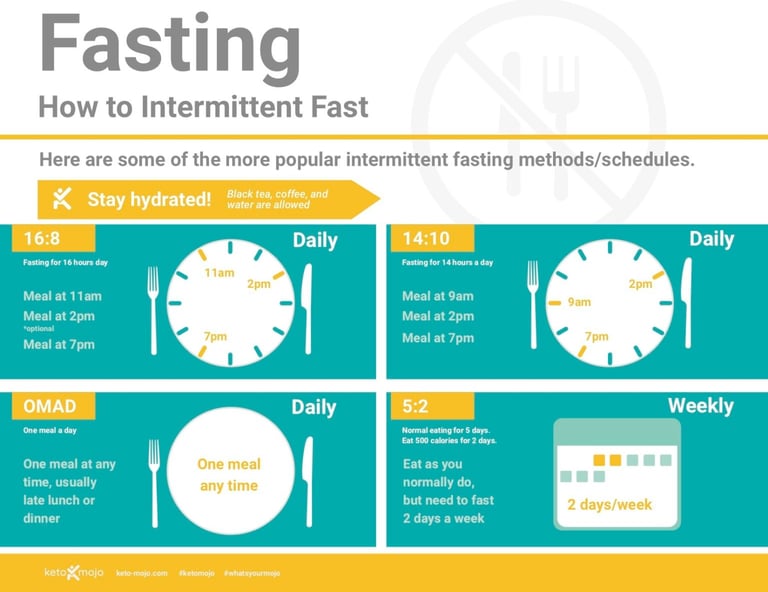Step by Step: Learn How to Do Intermittent Fasting and Enjoy Its Wonderful Benefits
TOP POST
Dr. Carlos Peñaloza
1/12/20255 min read


Introduction
Intermittent fasting has become a popular trend in the world of health and nutrition. In addition to promoting weight loss, this dietary approach has been shown to offer a wide range of health benefits. In this article, you will learn everything you need to know to start intermittent fasting and enjoy its wonderful benefits.
What is intermittent fasting?
Intermittent fasting is an eating pattern in which periods of fasting and eating alternate. Unlike traditional diets, which focus on what to eat, intermittent fasting focuses on when to eat. During periods of fasting, food intake is restricted, allowing the body to use its energy reserves and triggering a series of beneficial changes.
The history of intermittent fasting
Although intermittent fasting has gained popularity recently, its practice has a long history dating back to ancient times. Many cultures and religions have used fasting as a form of both physical and spiritual purification. In some traditions, fasting has been associated with improved health and longevity.
Benefits of intermittent fasting
Weight loss and fat burning
One of the best-known benefits of intermittent fasting is its ability to promote weight loss and fat burning. During periods of fasting, the body depletes glycogen stores and begins to burn stored fat as a source of energy. Additionally, intermittent fasting can increase metabolic rate, making it easier to lose weight in the long term.
Improved cardiovascular health
Intermittent fasting has been shown to have positive effects on cardiovascular health. It has been observed to reduce levels of LDL cholesterol, triglycerides and blood pressure, which decreases the risk of heart disease. Additionally, some studies indicate that intermittent fasting can improve insulin resistance and reduce inflammation, key factors in cardiovascular health.
Control of blood sugar levels
Intermittent fasting can be especially beneficial for people with diabetes or blood sugar regulation issues. During periods of fasting, the body can improve insulin sensitivity and regulate blood glucose levels more efficiently. This can help stabilize sugar levels and prevent sharp spikes and drops.
Improvement of brain function and prevention of neurodegenerative diseases
Intermittent fasting has been associated with brain health benefits. Some studies suggest that it may increase the production of new brain cells and improve cognitive function. Additionally, intermittent fasting has been shown to have protective effects against neurodegenerative diseases such as Alzheimer's and Parkinson's, possibly due to its antioxidant and anti-inflammatory properties.
Anti-inflammatory effects
Chronic inflammation is a contributing factor in many chronic diseases, such as heart disease, diabetes, and cancer. Intermittent fasting has been shown to have anti-inflammatory effects by reducing levels of inflammatory markers in the body. This can have a positive impact on disease prevention and overall health improvement.
Stimulation of cellular autophagy
Autophagy is a cellular process in which cells break down and recycle damaged or unnecessary components. Intermittent fasting has been associated with stimulating cellular autophagy, which may have benefits for longevity and the prevention of aging-related diseases such as cancer and heart disease.
Different methods of intermittent fasting
Credits to: https://thelifegreek.com/
There are several methods of intermittent fasting, each with its own characteristics and advantages. Below are some of the most popular methods:
Fasting of 8/16
16/8 fasting is one of the most common methods of intermittent fasting. It consists of a 16-hour fasting period followed by an 8-hour eating window. During the fasting period, non-caloric liquids such as water, coffee or unsweetened tea can be consumed.
24 hour fast
The 24-hour fast consists of a complete one-day fasting period, in which only the intake of non-caloric liquids is allowed. This method can be done once or twice a week, depending on individual preferences and goals.
Fasting of 5:2
The 5:2 fast involves eating normally for five days a week and restricting caloric intake to 500-600 calories for the other two days. These fasting days do not have to be consecutive and it is recommended to eat a healthy diet during regular eating days.
Alternate fasting
Alternate fasting involves alternating days of complete fasting with days of normal eating. During fasting days, caloric intake is limited to a specific percentage, usually around 25% of total caloric needs.
prolonged fast
Extended fasting is a more extreme approach in which you fast continuously for several days or even weeks. This method requires medical supervision and should only be performed by experienced people and under specific circumstances.
How to start intermittent fasting
If you are interested in starting intermittent fasting, here are some steps you can follow:
Consult with a health professional
Before beginning any type of dietary changes, it is important to consult with a health professional, especially if you have any pre-existing medical conditions.
Set a goal and a plan
Define why you want to do intermittent fasting and set clear goals. Then, create a plan that fits your lifestyle and individual needs.
Start with an adaptation period
To ease the transition to intermittent fasting, you can start gradually by gradually increasing the length of your fasting periods.
Choosing the right fasting method
Select the intermittent fasting method that best suits your needs and preferences. You can experiment with different approaches until you find what works best for you.
Tips for success with intermittent fasting
Below are some helpful tips for success at intermittent fasting:
Stay hydrated during fasting: Drinking enough water and calorie-free fluids is essential to staying hydrated and feeling good during fasting periods.
Plan the right meals during the feeding period: Make sure you consume a balanced and nutritious diet during the feeding period to get all the necessary nutrients.
Listen to your body and adapt fasting as needed: If you experience discomfort or difficulties during fasting, listen to your body and adjust your approach as necessary. Don't be afraid to adapt fasting to your individual needs.
Conclusion
Intermittent fasting is an eating strategy that offers various health benefits, including weight loss, improved cardiovascular health, control of blood sugar levels, and stimulation of brain function. With the right methods and the right tips, intermittent fasting can be an effective option to improve your overall well-being.
Frequently Asked Questions (FAQs)
Below are some frequently asked questions about intermittent fasting:
Is intermittent fasting safe for everyone?
Intermittent fasting may be safe for most people, but it is important to consult with a health professional to determine if it is right for you, especially if you have any pre-existing medical conditions.
Can I exercise while fasting?
Exercise while fasting can be safe and beneficial for some people. However, it is important to listen to your body and adapt the exercise according to your individual needs.
How long does it take for the body to adapt to intermittent fasting?
The time it takes for the body to adapt to intermittent fasting can vary from person to person. It usually takes a few weeks for the body to fully adjust to this way of eating.
Can I drink coffee or tea during fasting?
Yes, you can drink unsweetened coffee or tea during fasting. However, it is important to avoid adding calories or sweeteners that can interrupt the fasting state.
Can I cleanse or detox during intermittent fasting?
Extreme cleanses or detoxes are not recommended during intermittent fasting. The best way to reap the benefits of fasting is to eat a balanced and healthy diet during your eating periods.


Reach Out
All rights reserved since 2024
